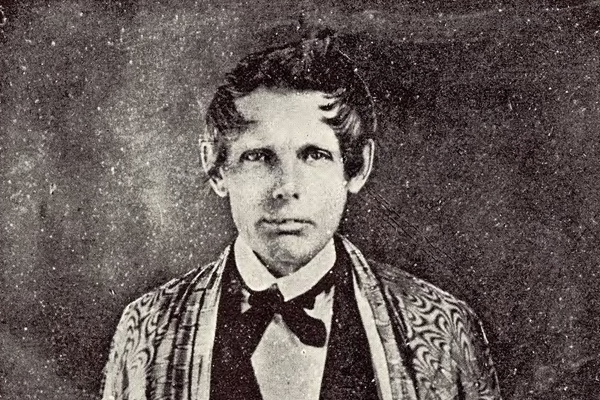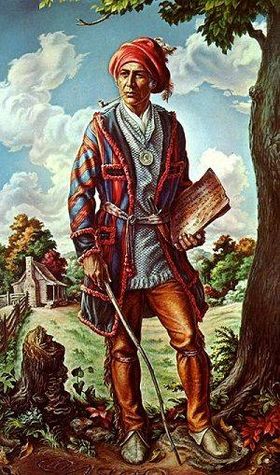The Messenger: Samuel Worcester and the Fight for Cherokee Land
Posted by Pete on Jan 22nd 2021
Born today in 1798 Samuel Worcester defended the sovereignty of the Cherokee and founded the first Native American newspaper.

Samuel Worcester (Picture credit: Cculber007/Wikimedia Commons)
Celebrated by some, Christopher Columbus’ arrival in the Caribbean began centuries of devastation for the indigenous people of the Americas.
From the Araucanians in the south to the Sioux in the north, the landfall of conquistadores and settlers from Europe brought social dislocation, brutal violence, and ethnic cleansing.
But Native America has never yet submitted to this assault.

In their struggle against empire and its racism, indigenous people across the Americas have practised all kinds of resistance.
Wars and rebellions have been fought against the invading armies of the United States, led by figures like Tecumseh (1768-1813) and Crazy Horse.
More recently, Native Americans practised mass civil disobedience during the 1960s and 1970s, protesting their occupation and marginalisation by US society.
In North America, indigenous history has also seen the building of alliances 'across the frontier' in order to resist the expansionism of the United States.
You’d be forgiven for thinking 19th century Anglo-America was a united front in support of the conquest and colonisation of Native American lands.
Even a relatively progressive President, Abraham Lincoln, oversaw in December 1862 the execution of 38 Dakota Sioux men – the largest, single, state-sanctioned mass execution in US history – for the 'crime' of rebelling against US authority.
And there were breaks in an apparent consensus for colonialism.
One such break can be found in the Vermont-born pastor, Samuel Worcester (1798-1859).
Born into a long line of clergymen, Worcester did not break step, graduating from Andover Theological Seminary as a Protestant missionary in 1823.
He expected a posting in faraway India or Palestine but ended up somewhere closer to home: the Cherokee lands of what was then the American Southeast, on the borders of the land-hungry state of Georgia.
Working with a Cherokee friend, Oowatie (known as Elias Boudinot to the Europeans), and using the syllabary created by the Cherokee Sequoyah, Worcester created a printing press capable of printing words in Cherokee and helped establish the Cherokee Phoenix – the first Native American newspaper – in February 1828.
It was an immense achievement, the development of a new writing system for the Cherokee language.
Worcester became known among the Cherokee as 'A-tse-nu-tsi', meaning "messenger".
But there was no time to confine himself to cultural work – politics came banging on Worcester’s door.
Despite having already made land concessions in the hope of satisfying US greed, settlers coming from, and supported by, the state of Georgia, continued to violate Cherokee lands.

The Cherokee Sequoyah who developed a syllabary to create a writing system for the Cherokee language which was used by Worcester for the first Native American newspaper.
Hopelessly outgunned, Samuel Worcester devised a plan to stop Georgian expansionism through the US court system.
If the Supreme Court could be made to recognise the Cherokee as a sovereign nation, then Georgia would have to stop its attacks because only the federal government could handle US foreign affairs.
Anticipating the tactics of the later Civil Rights movement, Worcester and his fellow missionaries staged some good old-fashioned civil disobedience.
At their mission in Cherokee New Echota, Worcester and 11 other clergymen protested against a new Georgia state law requiring all white men have a license from the state to live on Native American land. They believed it was for the Cherokee to decide who could enter their territory, not the state of Georgia.
They were promptly arrested by the Georgia militia.
Offered a pardon, Samuel Worcester along with a man called Elizur Butler, nevertheless continued to refuse.
The plan was for their case to be taken all the way up to the US Supreme Court, where they hoped the Georgian license law would be declared unconstitutional because the Cherokee formed a sovereign nation.
Miraculously, in 1832, this worked. The Court ruled that the Cherokee Nation was independent and so the federal government, not individual states, was the only body able to deal with it.
But it wasn’t enough.
Laws cannot halt justice when the struggle is powerful enough, but the same is true of injustice – and the injustice of US expansion had the backing of mighty forces, right up to President Andrew Jackson himself.
The Supreme Court was ignored, and Georgia, backed by the federal government, continued to steal Cherokee land, driving the Cherokee people ever further west in the 'Trail of Tears'.

Native American history is often a place of profound tragedy, but it also contains seeds of hope from which we can find strength, from the battle-hardened courage of Tecumseh to the transnational solidarity of Samuel Worcester and his Cherokee brothers.
